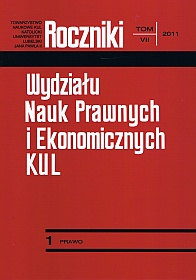The Analysis of the Institution of no Contest Plea in Practical Approach
Abstract
Poland belongs to the circle of European states in which it is permitted that the participants of penal procedure can come to agreement. The codification of 6th June, 1997, introduced two reforms of consensual complementary dispute resolution: conviction without a trial in art. 335 of penal code and conviction in line with the limited trial in art. 387 of penal code is defined by a common term of entering a no contest plea. In principle, the goal of the institution under discussion is to accelerate and make more effective the penal trial. If in technical literature this institution was generally accepted, in practice, despite the fact that it has been functioning for 14 years, it still arouses doubts. It follows mainly from the fact that there is no unanimous regulation of the rules. One should pay special attention to the fact that the aggrieved party has not been taken into consideration in art. 335 of the code of criminal procedure. One should then postulate to change this regulation because in practice it leads to abuses.
References
Bieńkowska, B. T., Nowy kodeks postępowania karnego przez pryzmat wybranych zasad procesowych, [w:] P. Kruszyński, Nowe uregulowania prawne w kodeksie postępowania karnego z 1997 r., Warszawa 1999.
Grzegorczyk T., Wniosek oskarżonego o skazanie go bez przeprowadzania postępowania dowodowego na rozprawie, „Przegląd Sądowy” 2000, nr 1.
Hofmański P., Kodeks postępowania karnego, t. II, Warszawa 2007.
Kardas P. Konsensualne sposoby rozstrzygania w świetle nowelizacji kodeksu postępowania karnego z dnia 10 stycznia 2003, „Prokuratura i Prawo” 2004, nr1.
Koper R., Zgoda oskarżonego jako warunek skazania bez rozprawy, „Palestra” 2001, nr 5-6.
Kurowska K., Konsensualne sposoby zakończenia postępowania karnego a sytuacja procesowa pokrzywdzonego, „Prokuratura i Prawo” 2002, nr4.
Osińska A., Skazanie bez rozprawy – art. 335 k.p.k., „Prokuratura i Prawo” 2008, nr9.
Rogoziński P., O niektórych procesowych aspektach dobrowolnego poddania się przez oskarżonego odpowiedzialności karnej, „Palestra” 2001, nr 1-2.
Stefański A. R., Wniosek prokuratora o skazanie oskarżonego bez rozprawy, „Prokuratura i Prawo” 1998, nr 2.
Waltoś S., „Porozumienia” w polskim procesie karnym de lege lata i de lege ferenda, „Państwo i Prawo” 1992, nr 7.
Waltoś S., Nowe instytucje w kodeksie postępowania karnego, „Państwo i Prawo” 1997, nr 8.
Zachuta A., Proces karny skrócony, „Palestra” 2000, nr 7.
Zbrojewska M., Dobrowolne poddanie się karze w kodeksie postępowania karnego, Białystok 2002.
Copyright (c) 2011 Roczniki Wydziału Nauk Prawnych i Ekonomicznych KUL

This work is licensed under a Creative Commons Attribution-NonCommercial-NoDerivatives 4.0 International License.

